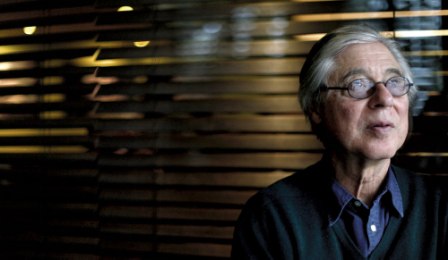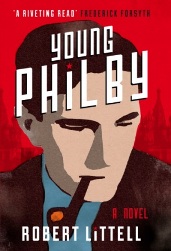Robert Littell is a bestselling American novelist and journalist who specializes in spy novels concerning the CIA and the Soviet Union. He has been awarded the Crime Writer’s Association Gold Dagger and the LA Times Book Prize. His New York Times bestselling novel The Company was adapted into a TV series. He served for four years in the U.S. Navy and is a former Newsweek writer. He currently lives in France.

When Kim Philby fled to Moscow in 1963, he became the most infamous
double agent in British history. A member of the intelligence services since
World War II, he later rose to become ‘our man’ in Washington. The exposure of
other members of the Cambridge Five led to the revelation that Philby had been
working for the KGB for even longer than he had been part of MI6. Yet he
escaped, and spent the last twenty-five years of his life in Moscow.
Young Philby tells the story of this traitor through the eyes of more than twenty characters. As each layer is revealed, the question arises: Who, really, was this man?
Coda: A True Spy Story
Where the Author of Young Philby Explains Why the Idea That Kim Philby Might have been a Double Agent— Or Should That be Triple?—is Not Far- Fetched.
I
spent the winter of 2000 in Jerusalem doing research for a novel set in the
Middle East. One evening I had dinner with my great friend Zev Birger, the head
of the Jerusalem Book Fair at the time. He had been instrumental in introducing
me to then retired prime minister, now president of Israel, Shimon Peres, with
whom I eventually collaborated on a book of conversations. Zev, who was said to
know everyone important in Israel, asked me out of the blue if there was anyone
in the country I wanted to meet that I hadn’t met. I told him that as a matter
of fact there was. It was the long-time mayor of Jerusalem, Teddy Kollek, by
then retired.
The next morning Zev phoned to say he had arranged a
rendezvous. At noon on 31 January 2000 I turned up in Teddy Kollek’s office at
the Jerusalem Foundation on Rivka Street. Mr. Kollek, a heavy man, then
eighty-nine, who smoked thin cigars, waved me to a seat across the desk
from him and asked why I wanted to see him. He regarded me through professorial
half-glasses that had slipped down along his nose. I explained that I was
familiar with his biography: He’d grown up in Vienna and had been active in
Socialist circles there in the early 1930s. I was curious to know if Mr. Kollek
had come across a young Cambridge graduate in Vienna named Kim Philby. Mr.
Kollek said that everyone in the leftist community in Vienna had been
acquainted with Philby in those days, that he himself knew him by sight. I
asked if Mr. Kollek had known Litzi Friedman as well. Yes, he said, he’d known
Litzi well enough to say hello to her; in Vienna, he continued, everyone knew
she was a Communist and many assumed she was some sort of Soviet agent. I asked
if Mr. Kollek was aware that Philby and the Friedman woman had gotten married
in Vienna after the right-wing Chancellor Dollfuss suppressed the Socialists
and Communists in 1934. Again he said yes, it was common knowledge that Philby
had married Litzi to get her a British passport. And then, to my surprise, he added
that it had been widely assumed Litzi Friedman must have recruited Philby as a
Soviet agent.
Unprompted, Mr. Kollek began telling me another story:
When the Jewish state was born in 1948, the Mossad, Israel’s CIA, was eager to
contact the new American Central Intelligence Agency, but the CIA people,
believing that the Mossad could have been infiltrated by Soviet agents posing
as Jewish refugees, kept the Israelis at arm’s length. After repeated requests,
the Americans finally relented and agreed to a first tentative meeting. It was
Teddy Kollek, working for the Mossad, who was dispatched to a certain room in
the Statler Hotel in Washington to make contact. The person representing the
CIA at that initial meeting turned out to be none other than its legendary
counter-intelligence chief, James Jesus Angleton.
A word about James Angleton: Fresh out of Yale
University in the early 1940s, he’d joined the American wartime intelligence
organization, the Office of Strategic Services, and been posted to London to
learn counter-intelligence from His Majesty’s Secret Intelligence Service. It
was the older and more experienced Kim Philby, a rising star in the SIS, who
took the young American under his wing. The two became fast friends, bunking
together on beds in the SIS building during the German blitz, climbing to the
roof to watch the German bombers raiding London. After the war in Europe ended,
Angleton moved on to direct OSS operations in Italy and when President Truman
created the Central Intelligence Agency in the late 1940s, Angleton became its
counter-intelligence chief.
When Teddy Kollek and Angleton met in the Statler, they
hit it off and became good friends. In Mr. Kollek’s words, they had a close
relationship. Mr. Kollek brought Angleton, whose hobby was growing orchids,
rare Israeli orchids from a farm that belonged to the Rothschilds and dined
with Angleton and his wife, Cicely, at their Washington home. And of course
they regularly collaborated on intelligence matters.
Fast forward to 1952: With the Cold War in full swing,
Mr. Kollek came to Washington to see his friend Angleton at the CIA buildings,
old World War II barracks on the Reflecting Pool. “I was walking towards
Angleton’s office,” Kollek told me when I interviewed him in Jerusalem, “when
suddenly I spotted a familiar face at the other end of the hallway. There was
no mistake about it. I burst into Angleton’s office and said, ‘Jim, you’ll
never guess whom I saw in the hallway. It was Kim Philby!’ And I told him about
Vienna and the marriage to Litzi Friedman and the suspicion that Philby may
have been recruited by her as a Soviet agent.
And I said, ‘Once a Communist, always a Communist.’
”
Startled, I asked Mr. Kollek if those had been his
exact words. “Yes,” he said. “I told him, ‘Once a Communist, always a
Communist.’ ”
I asked if Angleton had reacted. “No, Jim never reacted
to anything. The subject was dropped and never raised again.”
When Mr. Kollek spotted Philby at the end of the
hallway, he was serving in Washington as liaison between the Brits and their
American counterparts at the CIA and FBI. Kim met with his old pal from London,
Jim Angleton, almost daily. The two regularly lunched together at a Georgetown
watering hole on Fridays.
“What happened after you told Angleton about Philby and
Vienna?” I asked.
I have this memory of Mr. Kollek concentrating on the
ash threatening to drop off the end of his cigar. “Your guess is as good as
mine,” he replied.
My guess is at the heart of Young Philby.
In the course of Angleton’s long career, which ended
when he was fired by CIA Director Colby in 1975, the counter-intelligence
chief was obsessed with the possibility of Soviet penetration. CIA employees
who spoke fluent Russian or had Russian or Polish-sounding names fell under a
cloud. Lie detector tests were administered left and right; not everyone
passed. Careers were ruined by Angleton’s shadow of a doubt. Would-be defectors
were turned away for fear they might be Soviet disinformation agents.
Ultimately the CIA’s entire Soviet Russia division was gutted and its
operations against the Soviet Union crippled because of Angleton’s obsession
with Soviet penetration. Whether Angleton learned about Philby’s suspicious
past (Cambridge Socialist Society, Vienna, Litzi Friedman) from Teddy Kollek,
or knew it already, it is unthinkable that he would have permitted Philby to
set foot inside the CIA’s sanctum unless . . .
Unless he had personally turned Philby, or
Philby had been a British agent feeding disinformation to Moscow all along. In
the end, the best way to penetrate the Soviet Heart of Darkness would be to
make Moscow Centre think it had penetrated Western intelligence agencies. At
which point the British and Americans, in the words of my character The Hajj,
could feed the Soviets disinformation until the cows came home.
When Donald Maclean, on the point of being exposed as a
Soviet agent, fled to Moscow (along with Guy Burgess, who apparently lost his
nerve at the last moment and went with him), Kim Philby’s cover was blown.
Forced by SIS to resign in July of 1951, he ended up working as Middle East
correspondent for two London newspapers, The Observer and The
Economist, in Beirut. After he, in turn, fled to the Soviet Union in
1963, Angleton let drop hints to his CIA colleagues that there was more to the
Philby story than met the eye. The suggestion was obviously self-serving. But
was there more?
Teddy Kollek died on 2 January 2007.
The mystery of Philby’s ultimate loyalty lives on.

Young Philby By Robert Littell
Published 8th November 2012 £16.99 HBK, Duckworth Publishers
Main Photo © Paris Match
spyware apps for android
link cell spy monitoring software
letter to husband who cheated
femchoice.org why men cheat on beautiful women
i told my husband i cheated
read i want my husband to cheat
free pharmacy discount card
open walgreens in store coupons
coupons prescriptions
site prescription coupon card
discount prescriptions coupons
site discount card for prescription drugs
naprosyn 750 mg
open naprosyn jel nedir
ventolin prospecto
open ventolini cali
prescription discount coupons
abcomke.sk discount coupon for cialis
how long does naltrexone work
link injection for alcohol craving